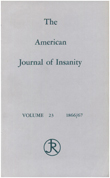Effect of naltrexone on alcohol "high" in alcoholics
Abstract
OBJECTIVE: Subjective effects of alcohol in alcoholics treated with naltrexone or placebo were compared. METHOD: In a previously reported double-blind clinical trial of 50 mg/day of naltrexone or placebo for treatment of alcoholism, 36 of 70 detoxified male veterans deviated from abstinence. Of these 36, 29 subsequently reported on the subjective effects of drinking during the trial. RESULTS: A larger proportion of naltrexone-treated subjects (seven of 12) than placebo- treated subjects (two of 17) reported that the "high" produced by alcohol during the study was significantly less than usual. The naltrexone-treated subjects also drank less alcohol than the placebo- treated subjects during the first drinking episode. There was no difference between groups in reported intoxication, craving, memory, or loss of temper. CONCLUSIONS: The lower alcohol consumption by the naltrexone-treated subjects may have resulted from naltrexone's blockage of the pleasure produced by alcohol.
Access content
To read the fulltext, please use one of the options below to sign in or purchase access.- Personal login
- Institutional Login
- Sign in via OpenAthens
- Register for access
-
Please login/register if you wish to pair your device and check access availability.
Not a subscriber?
PsychiatryOnline subscription options offer access to the DSM-5 library, books, journals, CME, and patient resources. This all-in-one virtual library provides psychiatrists and mental health professionals with key resources for diagnosis, treatment, research, and professional development.
Need more help? PsychiatryOnline Customer Service may be reached by emailing [email protected] or by calling 800-368-5777 (in the U.S.) or 703-907-7322 (outside the U.S.).



